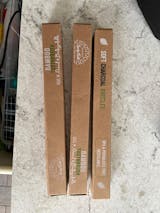Drinking orange juice right after brushing your teeth is a recipe for disaster. It tastes absolutely awful. Other foods aren't much better. Why does this happen, and what can you do about it?
What Happens in the Mouth When You Brush Your Teeth
You know the purpose of brushing your teeth: It's to get your teeth clean and fresh. What you might not know is exactly what's going on in your mouth when you brush. Toothpaste is made of various chemical compounds. Each one has a different job. Some scrub away stains. Others provide a fresh taste. And many toothpaste varieties add additional chemicals to create the classic foamy sensation that people often associate with brushing. Together, these chemicals clean your teeth, but some of them do more than just that.
Commercial Toothpaste Ingredients That Change Flavors
Commercial toothpaste contains foaming chemicals called surfactants. The most common ones are sodium laurel sulfate (SLS) and sodium laureth sulfate (SLES). These chemicals have an effect that you probably wouldn't expect. They're what's responsible for altering the flavor of your food!
When you brush with regular toothpaste, the chemicals react with the proteins in your mouth. That affects your taste buds for a while. They can't detect sweet flavors properly, so many foods become less appealing. Not only does SLS tamp down the sweetness you're expecting, but it also enhances your ability to pick up on bitter flavors. Yuck! No wonder certain foods taste so awful right after you brush with store-bought toothpaste.
Essential Oils That Might Change Flavors
Natural toothpastes often use essential oils to add appealing flavors to toothpaste. Mint oil is the most popular choice. Cinnamon and clove oils are used in some pastes too. These essential oils provide the fresh feeling that you're looking for from your toothpaste. Their flavors may mix with your first few bites of food immediately after brushing, but the effect shouldn't last long.
How to Avoid Unpleasant Tastes After Brushing
Can you brush your teeth in the morning without ruining your breakfast? Yes! These three tips can help you do it.
1. Wait 30 minutes.
Hopefully you are not using a conventional toothpaste with chemicals, but if you are, hen just wait a bit before making your breakfast. It typically takes only about 30 minutes for the effects of SLS to dissipate. After that, you should be able to enjoy a glass of morning OJ without a terrible pucker. For those who prefer natural toothpastes, it will only take a couple sips to wash off the flavors of essential oils.
2. Brush after breakfast.
If breakfast is the first thing on your mind when you wake up, then flip-flop your morning order. Eat right away, and then brush after you finish your meal.
3. Use natural toothpaste.
Finally, with a toothpaste that's SLS-free, you could have the best of both worlds. The taste of mint and other essential oils would be the only concern, but that doesn't linger long after brushing. When you choose natural toothpaste, you can brush and then prepare your breakfast right away. By the time you sit down to eat, you may be able to enjoy every bite of your breakfast without any conflicting tastes.
Lucky Teeth Natural Toothpaste Will keep your teeth and Body healthy
The sodium laurel sulfate and similar ingredients in commercial toothpastes can really mess up your taste buds for a bit after brushing. Fortunately, Lucky Teeth's all-natural toothpaste and Mouthwash are free of those ingredients. Use natural toothpaste first thing in the morning, right before a dinner date, or at any time of day for a sparkling smile with no unpleasant aftertaste and heath side effects.


